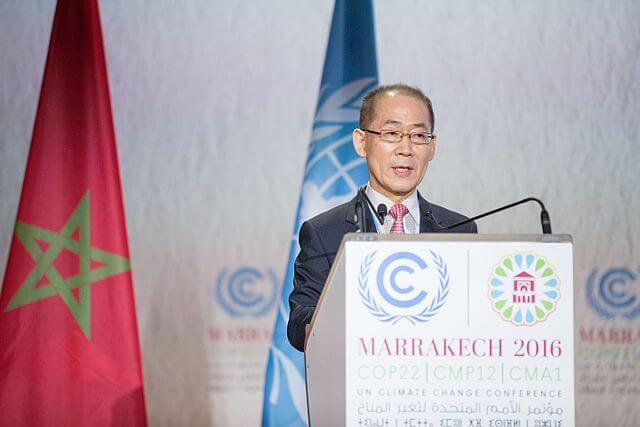
The head of the Intergovernmental Panel on Climate Change (IPCC), Hoesung Lee, has issued a warning that excessive reliance on carbon capture and storage (CCS) technology could push the world beyond critical climate tipping points.
Lee emphasised that the use of technologies to capture and remove carbon dioxide from the atmosphere is not a simple solution. He said to remove it from the atmosphere was “no free lunch” and that countries should be wary.
“But there will be a cost to doing that. There’s no free lunch. And that cost includes that the longer the period of overshoot, there will be additional global warming, and there will be consequences of increased warming. There is also the possibility of positive feedback from that additional warming, creating more losses and damages during the overshoot period,” he warned. “So one wishes to avoid such an overshoot scenario.”
Governments must make their own decisions on whether to use carbon capture and storage technology, Lee said, as the IPCC advised only on science, and was neutral on policy. “CCS technologies are all part of the solutions. The way to stay within the carbon budget is that [high-carbon] infrastructures should be equipped with some measures of emissions reductions. Our report very clearly indicates that unabated fossil fuels has to be changed, with some measures that can reduce carbon emissions.”
The IPCC’s comprehensive report on climate science, published in multiple parts from 2021 to 2022, delivered a clear message: urgent action is needed to mitigate emissions if we are to avoid the devastating impacts of climate change. While the report suggests it is possible to limit global temperature rise to below 1.5 degrees Celsius above pre-industrial levels by the end of the century, it also highlights the critical importance of immediate action.
Some proponents of the fossil fuel industry have misinterpreted the IPCC report to justify continued oil and gas production, citing the claim that a small amount of production in 2050 aligns with the goal of reaching net-zero greenhouse gas emissions. However, an IPCC author clarified that while the report allows for some oil and gas production in 2050, it does not imply an endorsement for ongoing fossil fuel operations. “We need to reduce fossil fuels drastically,” the author said.
Lee, who will step down as IPCC chair in late July, stressed the need for countries to approach carbon capture and storage with caution. While the technology has potential, it should not serve as an excuse to delay or undermine efforts to transition to clean energy sources and reduce emissions.
Mark Maslin, professor of earth system science at University College London, said: “Just because there is an understanding that complete removal of fossil fuel use would be almost impossible in this century is no justification to expand production. When we are aiming of a global net zero emission world by 2050 – this means no new fossil production now, halving production over the next 10 years and reducing it as close to zero as possible by 2050. None of this in any way justifies countries expanding their fossil fuel production and to use the IPCC as an excuse is dishonest and a misuse of the science.”
Prof Michael Mann, climatologist at the University of Pennsylvania, said that oil producers were misrepresenting the IPCC’s findings if they argued for a continued use of fossil fuels. “The IPCC doesn’t weigh in what energy sources will or will not be needed decades from now. While low levels of carbon emissions could be offset with negative emissions technology by 2050, there is no room in such scenarios for substantive reliance on oil, gas, or coal decades from now if we are to achieve the necessary reductions.”
Lee responded: “I have noticed that, in the past, various people cite the IPCC in a way that suits their needs, for unknown purposes. However, our report is a public document, produced by experts, and through numerous independent scientific reviews. Decision makers have their own independent judgements for their own policymaking. We provide the science.”
As the IPCC prepares to select a new chair from four candidates, including two women, it is crucial to maintain the momentum in addressing the climate crisis and implementing effective solutions that align with the IPCC’s findings.
——————————————————————————
At Natural World Fund, we are passionate about stopping the decline in our wildlife.
The declines in our wildlife is shocking and frightening. Without much more support, many of the animals we know and love will continue in their declines towards extinction.
When you help to restore a patch of degraded land through rewilding to forests, meadows, or wetlands, you have a massive impact on the biodiversity at a local level. You give animals a home and food that they otherwise would not have had, and it has a positive snowball effect for the food chain.
We are convinced that this is much better for the UK than growing lots of fast-growing coniferous trees, solely to remove carbon, that don’t actually help our animals to thrive.
This is why we stand for restoring nature in the UK through responsible rewilding. For us, it is the right thing to do. Let’s do what’s right for nature!
Donate today at https://naturalworldfund.com/ and join in the solution!

